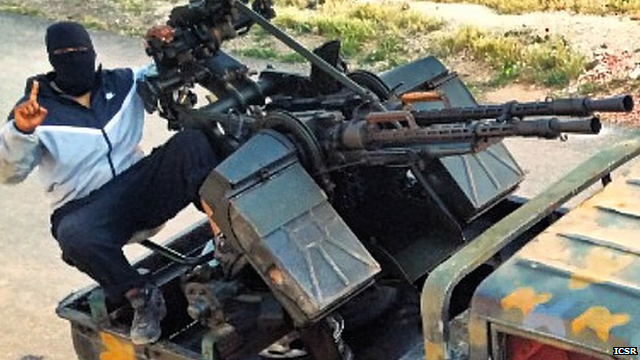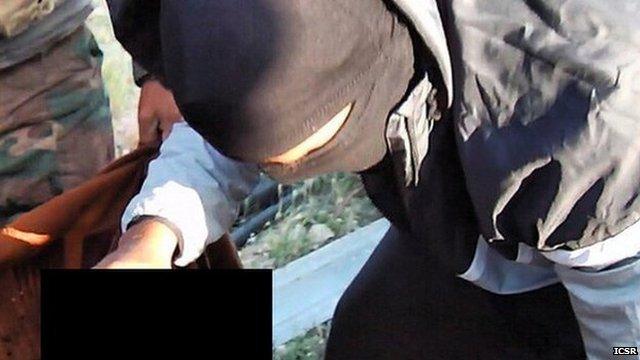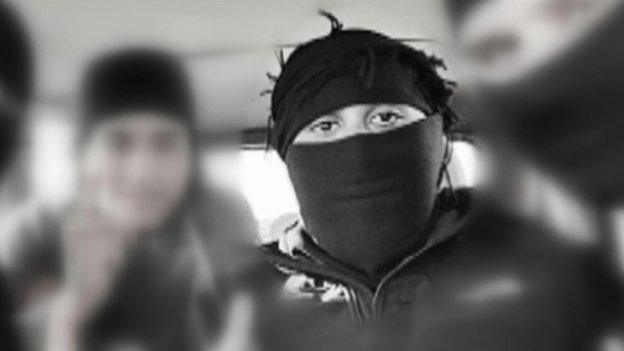Imran Khawaja: The jihadist who faked his own death
- Published

Imran Khawaja posted videos and pictures of his personal jihad. Pictures courtesy ICSR, Kings College London
A British man who went to fight in Syria - and then faked his own death in order to secretly return - has pleaded guilty to four major terrorism offences at the Old Bailey.
Imran Khawaja tried to sneak back into the UK last year - and while his exact activity in Syria remains a mystery, police say he is one of the most dangerous British jihadists to return from conflict.
He was one of the most public British fighters in Syria - always online, but always masked.
But now, Imran Khawaja, 27, from Southall, west London is facing a possible prison term up to life imprisonment for his role in life and death on Syria's battlefields.
Khawaja left the UK last January. He called himself Abu Daigham al-Britani. And after reaching the warzone via Kurdish territory, he began posting videos and pictures of his personal jihad.
In one video he explains how a fellow fighter was shot through the side - but "thanks to Allah's will" was soon back on the front line. In another - masked again - he is showing off his amateur weight-lifting skills as his brothers-in-arms cheer him on.
Khawaja was a member of Rayat al Tawheed - which means Flag of Unity. The group of fighters affiliated to Islamic State includes many British men, and they have spent more than a year selling a message to their supporters and would-be recruits back home.

Online propaganda: Just one of Rayat's many images
Khawaja was involved in appeals for donations, video diaries of their lives and "through the keyhole" tours of fighters' quarters.
Shiraz Maher, of the International Centre for the Study of Radicalisation (ICSR), at Kings College London, has been tracking foreign fighters in Syria and Iraq.
He says: "The group that Khawaja was with in Syria was really quite dynamic," he says. "They clearly had people with programming skills - they were able to put together very slick, well produced propaganda videos and posters that appealed to young British Muslims.
"They were able to play on the same cultural anchors and mores that those people recognised and know. They could speak to them as peers.
"Rayat al Tawheed helped a great deal in the early stages of this conflict with portraying the idea of volunteering as a jihadist as quite a glamorous adventurous thing - and a noble thing."
Gruesome images online
But Rayat's war was neither noble nor glamorous. Some of its material online showed gruesome scenes of death. One image showed a man's bloodied-hands with the caption "my first time".
And another shocking image included Imran Khawaja. In this gruesome picture, the Londoner - masked yet again - is holding a bag that contains a head.

Imran Khawaja holds a head (Pic: ICSR)
The only thing we know about the victim is that he was supposedly a Syrian army soldier. But we do know that the British security service MI5 was watching - and waiting.
And last June, its opportunity came.
Bulgarian road trip
Imran Khawaja decided to come home. It's not clear why because he hasn't told the police.
His cousin Tahir Bhatti, a taxi driver from Watford, agreed to help him return because the family wanted him back safely. Khawaja's own intentions are unclear. He had originally asked his cousin for money for a new gun - something Bhatti did not help him with. And then the fighter began trying to cover his tracks.
As Bhatti, who has admitted assisting an offender, drove to Bulgaria to pick him up, Khawaja faked his own death with an online obituary that said he had died in battle. The announcement asked that Allah grant him the highest position in heaven. He then tried to slip back into Britain unnoticed.

Khawaja's death notice posted online (Pic: ICSR)
As the pair arrived at Dover, the police were waiting - and they ended up facing prosecution at the Old Bailey.
Cdr Richard Walton, the head of the Metropolitan Police's counter-terrorism command, says: "Imran Khawaja is not a vulnerable teenager who has been enticed to travel to Syria.
"This is a man who chosen the path of terrorism, who has chosen to go out to Syria to be trained and engage in a terrorist training camp.
"We don't know why he came back, we don't know what he was planning - but we know he concealed his entry and faked his own death. This is a dangerous man."
Imran Khawaja was considered so dangerous that while he was on remand, he was held in the special unit for high risk terrorism suspects at London's maximum security Belmarsh prison.
He has admitted four offences:
preparing for acts of terrorism
attending terrorism training
receiving training
possessing a weapon for a terrorist purpose
Tahir Bhatti has pleaded guilty to assisting an offender.
Khawaja had originally faced an additional charge of soliciting to murder. That allegation, the most serious to be made yet against a Syrian fighter, will lie on file.

Imran Khawaja (left) with other fighters (Pic: ICSR)
- Published20 January 2015
